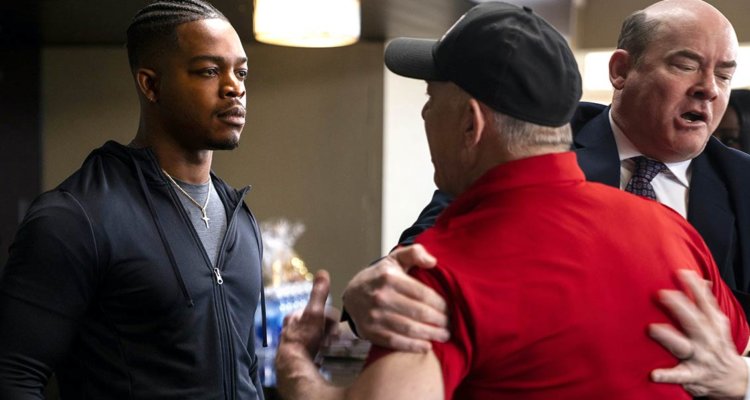Inspirational sports movies tend to be formula-heavy, and the football movie “National Champions” is no exception. Based on the true story of college athletes demanding to be equitably paid, “National Champions” is a formulaic and safe tale of teamwork, identity, and community, with soap opera-ish sensibilities to boot.
READ MORE: The 100 Most Anticipated Films Of 2022
Directed by journeyman filmmaker Ric Roman Waugh (“Shot Caller“), “National Champions” introduces us to the top-ranked Missouri Wolves, led by their fearless, stoic, and sometimes reckless leader LeMarcus James (Stephan James), known affectionately by his nickname, “GOAT.” Already a Heisman Trophy winner and on his way to becoming a number one NFL draft pick, he’s the kind of player who’s all-world, all-pro, and always ready. All he has to do is play in the championship game and not get hurt, and he’ll be on his way to fame, fortune, women, television.
It sounds simple enough, yet LeMarcus has other plans. As the plane arrives in New Orleans, he puts out a statement calling on both his teammates and the opposing team to join him in boycotting the game. He’s joined by Emmett Sunday (Alexander Ludwig), a tight end who advocates for fair pay. Before long, they are sending shock waves throughout the college football establishment, as the head of the NCAA, fearing where this might lead, enlists a team to talk them out of it.
“National Champions” starts with solid field position but begins slipping as it becomes soapier and piles on subplots, one involving the coach’s wife (Kristen Chenoweth) and another the deployment of a ringer (Jeffery Donavan) willing to use whatever tactics necessary to get LeMarcus on the field. “You won’t change anything,” he tells LeMarcus. “They will Kapernick you.” Lines like that offer plenty of fodder for debate: can one person make a difference? How does one make a difference? Why aren’t student-athletes paid for their work? If only the answers weren’t so obvious.
You don’t have to be Bill Belichick to understand what play is coming next: team meetings, celebrity cameos, talking heads. The standard sports movie structure has been haphazardly assembled, then filled with predictable beats, rote exposition dumps, and slangy, rapid-fire lines that are supposed to be “cool.” Laid on top of that is the player empowerment message. The message comes from a place of authenticity, but most of these arguments are presented without fresh insight or interrogation.
On the bright side of “National Champions,” the performances are solid and ferocious, evoking a sense of place far richer than the cinematography or general presentation. The supporting actors, Lil Rel Howery, Tim Blake Nelson, Timothy Olyphant, are terrific, especially Uzo Aduba, who gets the film’s only monologue about College Football’s impact. Whenever J.K. Simmons is on screen, as the Wolves’ coach, his presence is undeniable; his performance is a mix between Terrence Fletcher and Norman Dale.
Yet, it’s hard to focus on the performances when the rest of the movie and direction are bland, and Waugh’s play-calling is safer than Urban Meyer‘s. Every time he has a chance to take a risk, he kicks a field goal from the one-yard line. It’s unfortunate that a film with such a solid message, point of view, and premise ends up feeling smarmy, insignificant, and ultimately, formulaic. [C]

